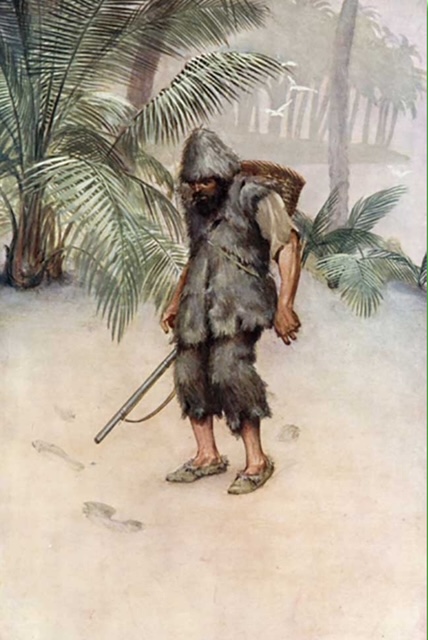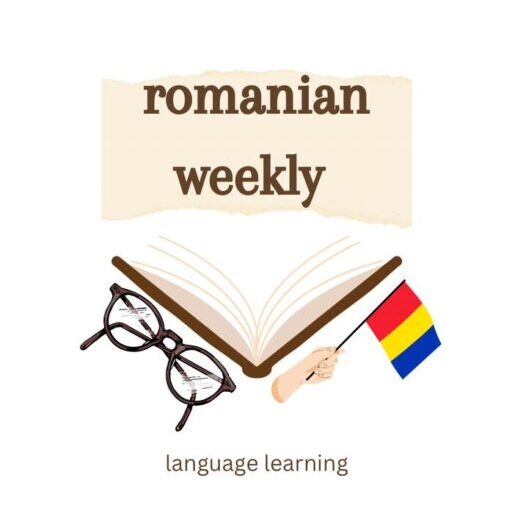
de Daniel Defoe
Când spaniolul se află în canoe, Vineri sare din canoe. Împinge canoea de-a lungul plajei.
În curând, ajungem la locul de lângă casa noastră. Vineri îi ajută pe oaspeții noștri să iasă din canoe. Dar ei nu pot să meargă. Trebuie să îi ducem acasă.
Mai avem o problemă când ajungem acasă. Tatăl lui Vineri și spaniolul nu pot trece peste gard. Mă gândesc la o soluție.
În primul rând, vreau să îi trec peste gard. Dar canibalii au plecat deja. Nu există niciun pericol din partea lor acum. Deci, putem rămâne în fața gardului.
Le facem un cort în fața gardului. Le pregătim și paturi moi.
Când terminăm asta, încep să gătesc cina. Vineri aduce niște pește și îi gătim repede. Luăm cina împreună în cort. Vineri îmi traduce pentru că spaniolul poate vorbi limba lui Vineri.
După cină, Vineri se întoarce la plajă. El aduce toate armele înapoi. A doua zi, îngropăm cadavrele canibalilor uciși. Este multă muncă.
Vorbesc cu tatăl lui Vineri a doua zi dimineață. Vreau să știu ce crede despre canibali. Întreb: „Se pot întoarce? Ne pot ataca?”
El spune: „Nu, ei nu ne pot ataca. Le este frică de arme. Ei cred că tu și Vineri sunteți duhuri trimise din cer.”
Încă sunt îngrijorat că se pot întoarce. Dar canibalii nu se mai întorc niciodată.
Când oaspeții noștri sunt suficient de puternici, încep din nou să mă gândesc la călătoria pe mare. Îl întreb pe spaniol de ce se află pe aceste insule. Spune că este de pe nava spaniolă. El spune că mai sunt șaisprezece europeni pe insula lui Vineri. Sunt spanioli și portughezi. Vor să meargă acasă, dar nu pot construi o navă pentru că nu au unelte. Îi arăt spaniolului uneltele pe care le am de pe navă. El spune că cu uneltele mele este posibil să construiesc o navă.
Cred că spaniolul și tatăl lui Vineri se pot întoarce pe insula lor. Ei pot spune altor europeni despre instrumentele mele. Împreună putem construi o navă. Apoi, putem merge în Brazilia sau Havana sau poate în Europa.
Dar spaniolul vrea altceva. El spune: „Ar fi mai bine dacă așteptăm ceva timp. Nu este suficientă mâncare pentru alți șaisprezece bărbați pe insulă. Avem nevoie de mai multă mâncare când construim nava.” Sunt de acord cu el.
El și tatăl lui Vineri ne ajută să extindem gardurile și câmpurile.
Ori aici:
https://romanianweekly.podbean.com/e/116-robinson-crusoe-26-nivel-a1
In English:
When the Spanish is inside the canoe, Friday jumps out of the canoe. He pushes the canoe along the beach.
Soon, we reach the place near our house. Friday helps our new guests out of the canoe. But they aren’t able to walk. We have to carry them to our home.
We have another problem when we reach our house. Friday’s father and the Spanish can’t go over the fence. I think about the solution.
First, I want to pull them over the fence. But the cannibals are already gone. There is no danger from them now. So, we can stay outside the fence.
We make a tent for them outside the fence. We prepare soft beds for them too.
When we finish this, I start to cook dinner. Friday brings some fish and we cook them quickly. We have dinner together in the tent. Friday translates for me because the Spanish can speak Friday’s language.
After the dinner, Friday goes back to the beach. He brings back all the weapons. The next day, we bury the bodies of the killed cannibals. It’s a lot of work.
I speak with Friday’s father the next morning. I want to know what he thinks about the cannibals. I ask, “Can they return? Can they attack us?”
He says, “No, they can’t attack us. They are scared of the guns. They think that you and Friday are spirits sent from heaven.”
I’m still worried that the cannibals can return. But they never return.
When our guests are strong enough, I begin to think about the journey by sea again. I ask the Spanish why he is on these islands. He says that he is from the Spanish ship. He says that there are sixteen Europeans on Friday’s island. They are Spanish and Portuguese. They want to go home, but they can’t build a ship because they have no tools. I show the Spanish the tools which I have from the ship. He says that with my tools it’s possible to build a ship.
I think that the Spanish and Friday’s father can return to their island. They can tell other Europeans about my tools. Together we can build a ship. Then, we can go to Brazil or Havana or maybe Europe.
But the Spanish wants something else. He says, “It’s be better if we wait for some time. There isn’t enough food for sixteen other men on the island. We need more food to eat when we build the ship.” I agree with him.
He and Friday’s father help us expand the fences and fields.


